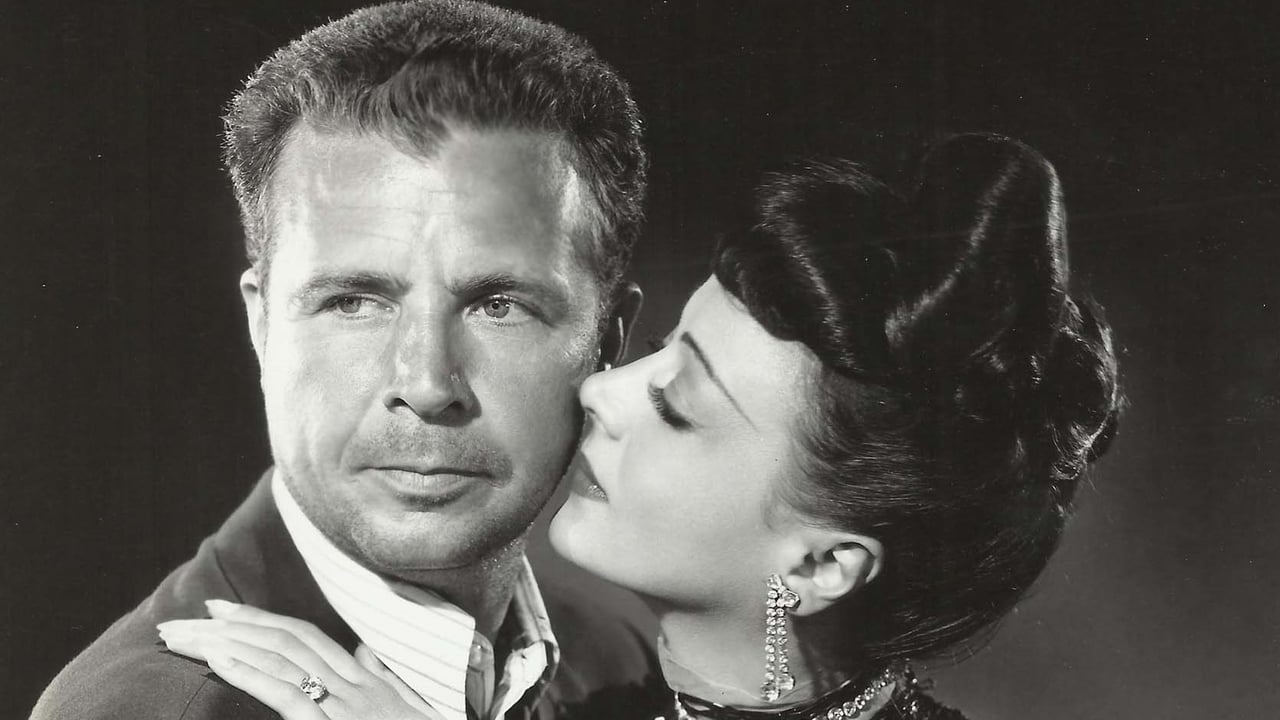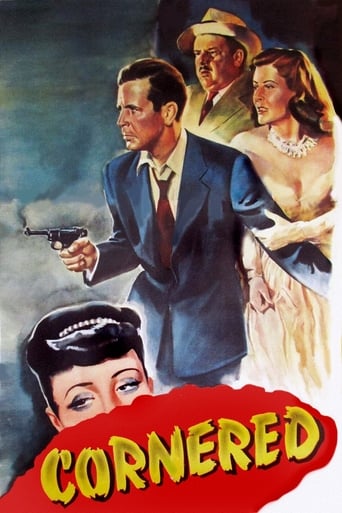

CORNERED is an oddity. It's a cross between a War era espionage thriller and film noir. It takes place in several countries - but, not the U.S.. - and the lead character is a Canadian and not your typical American.Dick Powell plays an embittered soldier (Gerard) who finds out his wife in France has been killed by the mysterious, and presumed dead, Marcel Jardac (Luther Adler). The trail leads him to Buenos Aires, Argentina where he gets involved in a nest of spies, war collaborator, profiteers and......insurance men! The machinations strain credulity at times, and some of the complications read as ways to mis-direct the audience more than to create genuine complexity. Still, the dogged pursuit by Gerard and the colorful characters including a lawyer named Santana (Morris Carnovsky), Jarnac's widow (Micheline Cheirel) and an oily local 'guide' Melchior (Walter Slezak - was there ever a better name for a Film Noir character actor?!) keeps the film interesting enough. Edward Dmytrk's direction is efficient, if a bit diffident at times. I am not the biggest fan of Powell in Noir roles, but he has his moments here.What elevates CORNERED is the long finale in a rundown cafe after hours. All of the key figures converge and it's a bang up - and, quite nasty - sequence. Tough and aggressive. If only more of the film were so tightly wound.
... View MoreEarly entry in the film-noir cycle and taking place in a "real-time" post war milieu, this one has the odd distinction of not having any Americans in the story. Even our beleaguered War Hero is Canadian. This was a trend that developed during the war as the world began to shrink rapidly and we all became Earth citizens.The darkness and ambiguity of the film is by design. Although the Axis had been defeated it did not come without a very heavy toll. Here the psychological pain manifesting itself in dizziness and headaches slows down but does not stop our angry, bitter, revenge seeking husband from taking on what's left of the "scum, not salt, of the earth".Some very typical cynical dialog and fast talking back and forth keep things moving, as does the interesting lighting and claustrophobic sets that "corner" this joyless juggernaut as he stumbles through a maze of deception to defeat not only the murderers of his wife but the enemies of the free world and their diabolical determination.Heavy going, deep and convoluted plot developments, and wordy transitions make for an uneasy visionary venture infected with PTSD. This is how film-noir celebrated V-Day.
... View MoreCornered (1945)"You can't be serious," the cheerful man said to Dick Powell, playing an ex-soldier in post-war Argentina. "I'm always serious," Powell replies. And he is. This defines the actor, and the character, and the doggedness of this character's pursuit of some mystery in the movie. It's impressive and wearing--a little humor might make him more human, yes, and it would also make the move more watchable. The cheerful man is a mystery, too, played with usual irony and crossed agendas by Walter Slezak (seen in a similar role in "Born to Kill").Director Edward Dmytryk is as usual just short of superb. I don't think he has a bad film, but he often worked with compromised material (the story here is an example) or he worked too quickly (my guess) to pull together something extraordinary. But putting it this way is meant to say this movie has lots of aspects that are great.One strength is the section of shots of what looks like genuine war torn France made months after the end of fighting. Another highlight is the film noir style throughout--the lighting, the clipped dialog, the lone man against the world, the brooding depression. Powell is his own kind of attraction. As offputting as his anger can get after awhile, it's exactly what makes him good, bullheaded and bulldozing his way through a complex network of enemies (who would really just kill him in short order if this was a realistic film, which no noir is). The plot is unusually hard to follow (though other noirs come close, like "The Big Heat"). And the antagonists are largely only talked about--Powell is searching for someone, and that person and his collaborators are either unseen or so duplicitous you don't know where he stands, and so the ominousness gets vague, but also beautifully diffuse and omnipresent. It is this oppressiveness that is part of the success here, even as you get lost with the details of the plot. There are some nice night shots (one briefly in the park is ominous) and many facial close ups. There is a terrific conversation on a subway platform with the noise of the cars drowning out the talk now and then, great audio effect. And so the filming is worth the ride alone at times. The music is intense and dramatic, the bit actors really powerful even if they sometimes do foolish things (the valet getting shot, or half of the things Powell does).In the film noir "cycle" this is early--the core films come after WWII, so this, along with "Double Indemnity," is cutting edge in that sense. It's also definitive in its mood. It's not a crime film, not a gangster story (which is where the hard film style has its American roots). It's a plot about how a person tries to rearrange his life after having it messed up, internally and externally, by the war. Powell is a perfect early noir leading male (the other famous one in the 1940s is Bogart). So this is a critically important film, maybe more important than truly enjoyable, but if you like noir it'll be terrific enough to hold you. If you aren't predisposed to like this kind of story, you'll find it meandering and dull and confusing. Me? I'm predisposed to like it, and I did, and I'll even watch it again, probably figuring it out a little more and enjoying it better.
... View MoreThis film was released within months of the end of World War II, and one suspects that it just showed a world that couldn't quite live without the paranoia it had lived on for a half a decade.The plot is that a Canadian pilot is looking for the Vichy collaborator who ordered the death of his French wife ("A bit too skinny, having been squeezed in between two wars" he describes her.) He is caught up in a web of collaborators and self-serving people trying to wiggle their way past world war II and into the Cold War, I guess.Powell is pretty good in this, showing the effects of Post-Traumatic Stress Syndrome before we gave it a fancy name. The notion that Fascism and Nazism had gone to ground was a bit silly. Anyone who got there was just trying to escape a bad decision, not try again.Still, a fun movie to watch, it keeps your interest.
... View More